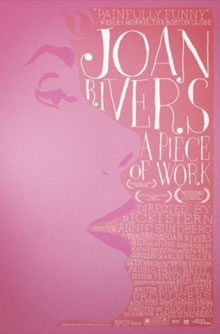Joan Rivers: A Piece Of Work
Written by: FFT Webmaster | July 7th, 2010
 When the center of your film is a person whose celebrated motor mouth is both the source of her fame and, sometimes, of her undoing, you definitely have a film that is about the marvels of talk, talk and more talk. That is certainly the case with the popular documentary JOAN RIVERS: A PIECE OF WORK, a disarmingly intimate portrait of the American comic legend. The documentary duo of Ricki Stern and Annie Sundberg were on-stage guests at the special screening of the film at the Jacob Burns Film Center last week, giving candid comments about the lady in question, Miss Joan Rivers.
When the center of your film is a person whose celebrated motor mouth is both the source of her fame and, sometimes, of her undoing, you definitely have a film that is about the marvels of talk, talk and more talk. That is certainly the case with the popular documentary JOAN RIVERS: A PIECE OF WORK, a disarmingly intimate portrait of the American comic legend. The documentary duo of Ricki Stern and Annie Sundberg were on-stage guests at the special screening of the film at the Jacob Burns Film Center last week, giving candid comments about the lady in question, Miss Joan Rivers.
For those not familiar with the rapid fire comic, Rivers emerged five decades ago as one of the first female comics to gain widespread fame with her signature line “can we talk?”. A Westchester housewife (completed with upswept hair and a string of inexpensive pearls), Rivers toned her craft in divy bars and strip joints before she got her first big breaks on the classic Ed Sullivan variety series and the Tonight Show with Johnny Carson. Her brand of self-deprecating humor (poking fun at her less than gorgeous looks and brassy loud mouth image), Rivers became so popular that she became the Tonight Show’s permanent guest host, before she was lured away by the nascent Fox Television Network to headline her own late night talk show (a move that forever distanced her from her former mentor Johnny Carson).
While Rivers’ light shined bright, she experienced personal tragedy, most specifically the suicide of her husband and manager (and frequent comic target) Edgar Rosenberg, and professionals ups and downs. However, at age 75, she still struggles to remain relevant for today’s audiences and to fill her schedule with club dates, both stellar and suburban. Frequently criticized of late because of her admitted addiction to plastic surgery, she is, above all, a survivor.
“We were mainly known for tackling serious subjects like Darfur and multinationalism “, co-director Ricki Stern explained on the stage of the Burns Film Center following last week’s screening. “My parents became personal friends of hers and suggested that it was long past due to have a documentary film chronicle her career. At first, I wasn’t quite sure, since I was not personally a fan, but the more time I spent around her, the more I realized that people did not know the story of the real woman behind the mask of the brash comedienne.”
Stern and Sundberg assembled a very small crew to simply Ms. Rivers around, as he bounced between club dates, television appearances and fretted with her intimate staff about the empty spaces on her calendar. “I’m like a shark”, Rivers states in the film, “if I don’t keep moving, then I will die.” This restlessness and desire to be the center of attention are evident in both her personal and professional relationships, including complex ties to her daughter (and frequent collaborator) Melissa Rivers and her manager, who is currently embroiling both Rivers and the filmmakers in what could be a messy lawsuit. Whether her need to be always be on to the next thing is a result of her innate inferiority complex as a woman who was not regaled as a great beauty or whether it is the grasping tenacity of a woman who is pathologically frightened of reaching her expiration date, the film offers an engaging and surprisingly poignant portrait of what it takes to remain on top of your game in a fiercely competitive industry.
“Rivers gave us unprecedented access”, Stern continued to recount. “After a while, she didn’t even notice the camera in the room, and for someone who is so used to being ‘on’, she was remarkably comfortable even when there were some unbearably poignant or difficult moments.” The film admirably makes its psychological points without feeling the need to hit one over the head with it (ugly duckling jokes about her unattractiveness, becomes addicted to reshaping her face, feels inadequate and under appreciated, etc.). To succeed in such a difficult business as show biz requires a fire within that does not always provide warmth towards others and that can, if not handled correctly, put oneself at great risk of being burned. In her caustic comedy, Rivers is not unlike a child playing with matches, who delights in the flame that she can create but seem helpless to respond if the fire grows too intense.
“She’s an original”, co-director Sundberg summed up. “If the film attracts her devoted core of fans and also brings in other people who will realize what a unique contribution she has made to the stature of women in entertainment, then we will have succeeded. ” Rivers, a fixture at televised red carpet events, may be on the receiving end of an accolade or two in the next awards season. The film has been a commercial hit for distributor IFC FILMS since its opening last month (with receipts of over $1 million and counting at the US box office and widening its release) after winning prominent awards at the Sundance, Tribeca, San Francisco and Seattle film festivals. Timed to her 75th birthday, it is turning out to be the “year of Joan”.

